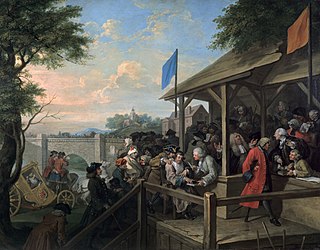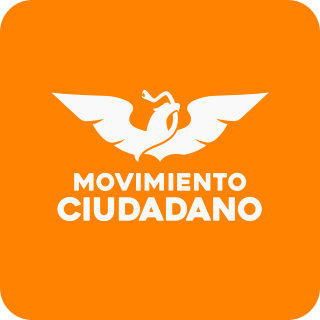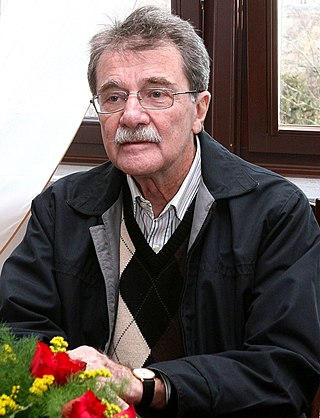
The Bolivarian Revolution is an ongoing political process in Venezuela that was started by Venezuelan President Hugo Chávez, the founder of the Fifth Republic Movement and later the United Socialist Party of Venezuela (PSUV), and his successor Nicolás Maduro. The Bolivarian Revolution is named after Simón Bolívar, an early 19th-century Venezuelan revolutionary leader, prominent in the Spanish American wars of independence in achieving the independence of most of northern South America from Spanish rule. According to Chávez and supporters, the Bolivarian Revolution seeks to build an inter-American coalition to implement Bolivarianism, nationalism and a state-led economy.

Peter Miguel Camejo Guanche was a Venezuelan American author, activist, politician and Sailing Olympian. In the 2004 United States presidential election, he was selected by independent candidate Ralph Nader as his vice-presidential running mate on a ticket which had the endorsement of the Reform Party.

Political colours are colours used to represent a political ideology, movement or party, either officially or unofficially. They represent the intersection of colour symbolism and political symbolism. Politicians making public appearances will often identify themselves by wearing rosettes, flowers, ties or ribbons in the colour of their political party. Parties in different countries with similar ideologies sometimes use similar colours. As an example the colour red symbolises left-wing ideologies in many countries, while the colour blue is often used for conservatism, the colour yellow is most commonly associated with liberalism and right-libertarianism, and Green politics is named after the ideology's political colour. The political associations of a given colour vary from country to country, and there are exceptions to the general trends, for example red has historically been associated with Christianity, but over time gained association with leftist politics, while the United States differs from other countries in that conservatism is associated with red and liberalism with blue. Mass media has driven a standardisation of colour by political party, to simplify messaging, while historically the colour a candidate chose to identify with could have been chosen based on other factors such as family or regional variations.
Green liberalism, or liberal environmentalism, is liberalism that includes green politics in its ideology. Green liberals are usually liberal on social issues and "green" on economic issues. The term "green liberalism" was coined by political philosopher Marcel Wissenburg in his 1998 book Green Liberalism: The Free and The Green Society. He argues that liberalism must reject the idea of absolute property rights and accept restraints that limit the freedom to abuse nature and natural resources. However, he rejects the control of population growth and any control over the distribution of resources as incompatible with individual liberty, instead favoring supply-side control: more efficient production and curbs on overproduction and overexploitation. This view tends to dominate the movement, although critics say it actually puts individual liberties above sustainability.

Elections in Venezuela are held at a national level for the President of Venezuela as head of state and head of government, and for a unicameral legislature. The President of Venezuela is elected for a six-year term by direct election plurality voting, and is eligible for re-election. The National Assembly (Asamblea Nacional) has 277 members (diputados), elected for five-year terms using a mixed-member majoritarian representation system. Elections also take place at state level and local level.

Citizens' Movement is a center-left political party in Mexico. It was founded in 1999 under the name Convergence for Democracy, which was then shortened to Convergence in 2002 and changed to Citizens' Movement in 2011.

Parliamentary elections were held in Venezuela on 4 December 2005 to elect the 167 deputies to the National Assembly of Venezuela, twelve deputies to the Latin American Parliament and five deputies to the Andean Parliament. Several days prior to the elections, five opposition parties unexpectedly withdrew, shortly after a dispute over the voting process had apparently been resolved with the support of the Organization of American States (OAS). The opposition had been expected to get around a third of the Assembly seats, or even less; the withdrawal meant the opposition were scarcely represented in the parliament at all, as the opposition parties which did not withdraw failed to win any seats. 114 seats went to the President's Fifth Republic Movement (MVR) – up from 86, with the remaining 53 going to "smaller pro-Chávez parties as well as to independents and representatives of some social groups that support the government".

Teodoro Petkoff Malec was a Venezuelan politician, economist and journalist. One of Venezuela's most prominent politicians on the left, Petkoff began as a communist but founded the democratic socialist Movement Toward Socialism party after the 1968 Warsaw Pact invasion of Czechoslovakia. Petkoff was elected as senator and ran for the presidency twice in the 1980s, being defeated both times. As Minister of Planning, he oversaw President Rafael Caldera's adoption of liberalization economic policies in the mid-1990s. He was a prominent critic of President Hugo Chávez and was a candidate to run against him in the 2006 presidential election until he dropped out four months before the vote to support Manuel Rosales. Petkoff launched the newspaper Tal Cual in 2000 and remained its editor until his death in 2018.
Chavismo, also known in English as Chavism or Chavezism, is a left-wing populist political ideology based on the ideas, programs and government style associated with the Venezuelan President between 1999 and 2013 Hugo Chávez that combines elements of democratic socialism, socialist patriotism, Bolivarianism, and Latin American integration. People who supported Hugo Chávez and Chavismo are known as Chavistas.

The United Socialist Party of Venezuela is a socialist political party which has been the ruling party of Venezuela since 2007. It was formed from a merger of some of the political and social forces that support the Bolivarian Revolution led by President Hugo Chávez.

Socialism of the 21st century is an interpretation of socialist principles first advocated by German sociologist and political analyst Heinz Dieterich and taken up by a number of Latin American leaders. Dieterich argued in 1996 that both free-market industrial capitalism and 20th-century socialism have failed to solve urgent problems of humanity such as poverty, hunger, exploitation of labour, economic oppression, sexism, racism, the destruction of natural resources and the absence of true democracy. Socialism of the 21st century has democratic socialist elements, but it also resembles Marxist revisionism.

The 2010 parliamentary election in Venezuela took place on 26 September 2010 to elect the 165 deputies to the National Assembly. Venezuelan opposition parties, which had boycotted the previous election thus allowing the governing Fifth Republic Movement (MVR) to gain a two-thirds super majority, participated in the election through the Coalition for Democratic Unity (MUD). In 2007 the Fifth Republic Movement dissolved and the United Socialist Party of Venezuela was formed as the leading government party. Nationally, the popular vote was split equally between PSUV and MUD, but PSUV won a majority of the first-past-the-post seats and consequently retained a substantial majority in the Assembly, although falling short of both two-thirds and three-fifths super majority marks.

Left-wing populism, also called social populism, is a political ideology that combines left-wing politics with populist rhetoric and themes. Its rhetoric often includes elements of anti-elitism, opposition to the Establishment, and speaking for the "common people". Recurring themes for left-wing populists include economic democracy, social justice, and skepticism of globalization. Socialist theory plays a lesser role than in traditional left-wing ideologies.

The Democratic Unity Roundtable was a catch-all electoral coalition of Venezuelan political parties formed in January 2008 to unify the opposition to President Hugo Chávez's United Socialist Party of Venezuela in the 2010 Venezuelan parliamentary election. A previous opposition umbrella group, the Coordinadora Democrática, had collapsed after the failure of the 2004 Venezuelan recall referendum.
Popular Will is a political party in Venezuela founded by former Mayor of Chacao, Leopoldo López, who is its national co-ordinator. The party previously held 14 out of 167 seats in the Venezuelan National Assembly, the country's parliament, and is a member of the Democratic Unity Roundtable, the electoral coalition that held a plurality in the National Assembly between 2015 and 2020. The party describes itself as progressive and social-democratic, and was admitted into the Socialist International in December 2014. The party was formed in reaction to complaints of infringements of individual freedom and human rights on the part of the government of the Venezuelan president Hugo Chávez and his successor, Nicolás Maduro. The party attempts to bring together Venezuelans of various backgrounds who consider Chavismo oppressive and authoritarian. Popular Will self-identifies itself as "a pluralist and democratic movement" that is committed to "progress", which it defines as the realization of "the social, economic, political, and human rights of every Venezuelan." The party says its "fundamental pillars" are progress, democracy, and social action.

Ecological Movement of Venezuela is a green political party in Venezuela.

The Land Party is a Galician political party that was established in 2011.

The New Order was a nationalist Venezuelan political party, with anticommunist and fascist tendencies that came from a student movement influenced by the authoritarian ideas of former Venezuelan president Marcos Evangelista Pérez Jiménez. The movement originated from the Universidad Central de Venezuela being originally called the Frente Nacionalista until it integrated itself into the Frente Unido Nacionalistia in 1973 before splitting from the party a few years before the elections of that year. It was founded as a national party in Caracas in 12 January 1974 where it established the title Nuevo Orden. It was first led by Miguel Cevedo Marín until Félix Díaz Ortega became the leader of the organization in 1978 who shifted the party closer into Neo-Nazism.















